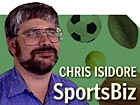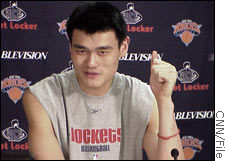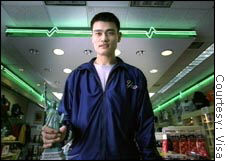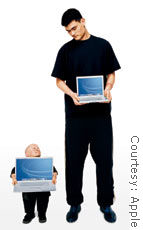
NEW YORK (CNN/Money) -
Houston Rockets center Yao Ming played his first game in New York this week, but the 7-foot 5-inch Chinese basketball star had already played and won the game played on the city's Madison Avenue.
Yao is a breakthrough in the world of advertising and endorsements -- a foreign-born athlete becoming one of the hottest stars in television commercials. He's the centerpiece of two national campaigns -- for Apple Computers (AAPL: Research, Estimates) and Visa, and has deals with sports apparel maker Nike (NKE: Research, Estimates) and sports drink Gatorade as well, though no commercials yet.
He's reportedly going to receive about $4 million in endorsement deals this year. Next year, when his Nike deal that predated his joining the NBA is up for renewal, his endorsement dollars are expected to easily top the 8-figure mark.
 |
|
| Yao Ming had won New York's ad game before he showed up to play his first basketball game in the media center. |
Athletes born overseas have been growing in prominence in U.S. sports for years, but no one has broken out with advertisers the way Yao has, especially in his first few months playing here.
The use of overseas athletes on advertisers may be about to grow, especially with Japanese baseball star Hideki Matsui coming to the media center New York to play for the Yankees this season.
But other overseas athletes still won't rival Michael, Tiger or the other U.S.-born superstar super-pitchmen, no matter how much success they have on the court or the field.
That's because a big part of the reason for Yao's off-court success is advertisers' desire to reach both the U.S. and Chinese markets, according to experts in the field.
 |
|
| Yao's Visa spot has been seen by far more U.S. viewers than his basketball games. |
"It's a place that offers a lot of opportunities," said David Schwab, director of strategic marketing & media for sports marketing firm Octagon. "Multinational companies are looking to mine China. Many will be sponsors of the 2008 Olympics there. Yao is obviously the most popular athlete there."
Nancy Friedman, vice president of advertising for Visa-U.S., said that Yao's deal with the credit card company is for only the United States, but that the company wouldn't rule out signing a separate deal for Asian rights with the star. She doesn't believe that Yao's success will necessarily prompt greater use of other foreign born stars by Visa or other advertisers.
"When you're using a celebrity, the celebrity has to fit your message," she said. "It's a case-by-case decision about what equities he or she brings to the product. It's not a matter of foreign born or U.S.-born."
 |
|
| Yao overcomes any language problems in his Apple campaign by not saying a word. |
Many of the successful foreign-born athletes in the United States are from the Caribbean and Latin America, markets that are not as attractive to many advertisers.
Dominican Republic-born baseball star Sammy Sosa had been the most successful foreign-born endorser until now, with a deal with baseball sponsor MasterCard, and a spot starting soon for Pepsi (PEP: Research, Estimates) with Yankees star Jason Giambi.
Sosa speaks English, although with an accent. The ability to speak English without an accent is a prerequisite for some advertisers, said Abraham Madkour, editor in chief of trade publication Sports Business Daily.
"I think it (language skills) is a factor, no doubt about it," said Madkour. "And not only foreign born athletes. I hear from agency types that language and the ability to be articulate are important to them."
| SportsBiz
|

|
| Click here for SI.com sports coverage
|
|
|
|
Yao overcomes any problems with language by not speaking in the Apple ad, which places him in juxtaposition with 2-foot, 8-inch tall actor Verne Troyer (aka Mini-Me) to highlight the difference in sizes between Apple's largest and smallest laptop computers.
Other than saying his name, Yao has one line in the Visa ad, "I'd like to write a check," which he practiced enough to speak without an accent.
One other thing working against foreign-born athletes is their relative absence from America's most popular sport -- football, and from its growing sports, such as Nascar or youth-oriented extreme sports.
| Related columns
|

|
|
|
|
Baseball, where a team of the best U.S.-born stars would probably have trouble beating a team of foreign-born stars, is just not the hot sport in terms of endorsements.
"Baseball has not had 10 players used in big campaigns," said Doug Shabelman, senior vice president of Burns Sports & Celebrities. "If you're looking for a younger crowd, do you think you're better to go with a baseball player or a snowboarder?"

|

